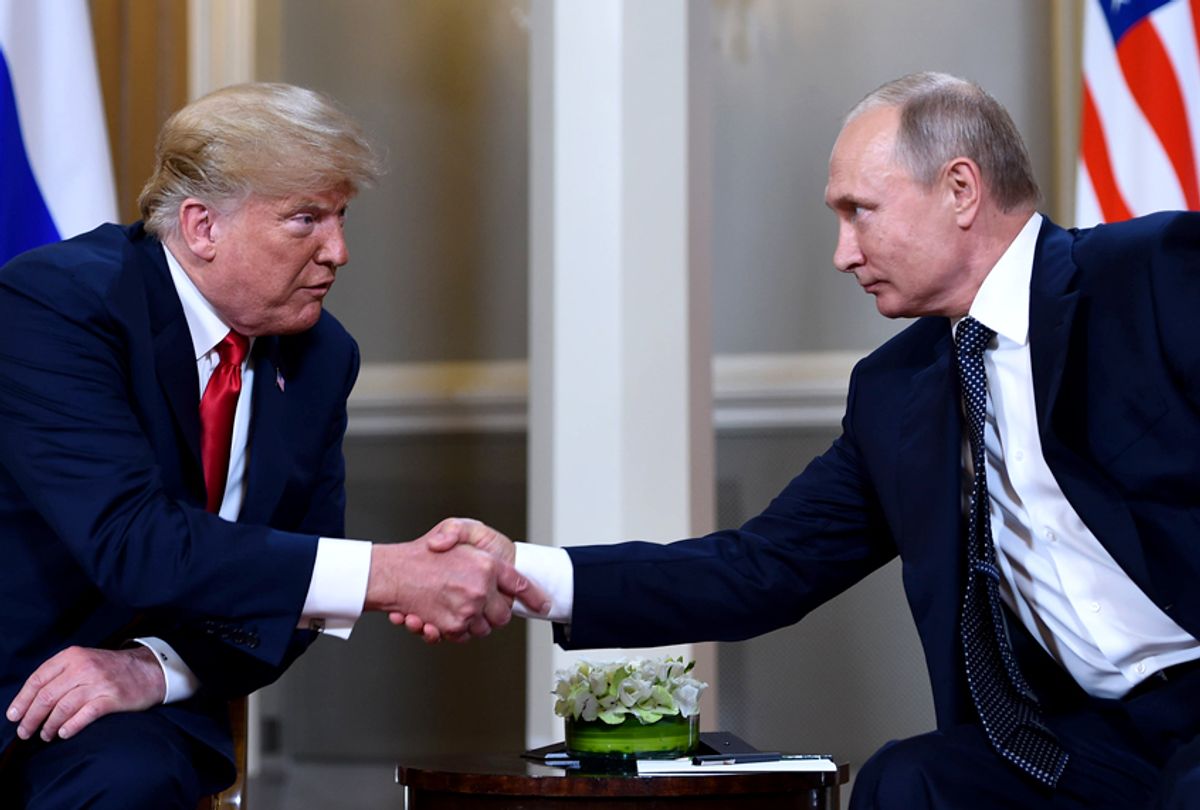It is safe to say President Trump did not read the new National Intelligence Strategy of the United States (NIS) released on Tuesday.
Which is a good thing.
The document shows the intelligence community (meaning the 17 U.S. government intelligence agencies) has mobilized against the threat posed by President Trump, his incoherent impulses on war and peace, and his furtive machinations with Russia.
Much of the 36-page glossy report, issued by Director of National Intelligence Dan Coats, will be daunting to outsiders: boilerplate mission statements mixed with inter-office shoutouts, and deep dives on complex organizational issues.
But the conclusions of the Intelligence Community (IC) (which some will call the “deep state”) are stated up front.
If Trump had read them, he would have noticed his government’s 17 clandestine services had targeted his friends in Moscow, his business partners in the skyscraper hotel business.
The IC is on the record (again) as saying the threat of Russian penetration is not “fake news,” not a hoax, but a menace.
"Radical Islamic terror" redefined
Some argue that the IC finding on Russian interference in the 2016 election was only signed by four of these 17 agencies.
In the new document, the other 13 agencies weigh in. They don’t disagree much: Russia is the emerging threat.
The report opens:
“Traditional adversaries will continue attempts to gain and assert influence, taking advantage of changing conditions in the international environment — including the weakening of the post-WWII international order and dominance of Western democratic ideals, increasingly isolationist tendencies in the West, and shifts in the global economy. These adversaries pose challenges within traditional, non-traditional, hybrid, and asymmetric military, economic, and political spheres. Russian efforts to increase its influence and authority are likely to continue and may conflict with U.S. goals and priorities in multiple regions.”
Note the absence in the above of the T-word. The threat of transnational terrorism — that hardy perennial of U.S. national security doctrine for 20 years — is not mentioned.
No mention of “radical Islamic terrorists,” which was once a go-to line for Trump.
The 2019 IC has made it official: the “radical Islamic terrorists” have been replaced by “traditional adversaries.”
This is a good thing, too. The idea that a network of religious fundamentalists, armed with rifles and homemade explosives, posed an existential threat to the American people was a Bush-Cheney meme that expired about the same time that Osama bin Laden departed.
The rise of Trump has coincided with — perhaps caused — the decline of counterterrorism as a declared U.S. policy priority.
This is another good thing. This is not to praise Trump’s geopolitical acumen (of which he has none), merely to state the facts.
The last 18 years of U.S. counterterrorism policy have made Americans (but not Europeans) marginally safer. It has cost us $5 trillion. It has embroiled our volunteer army and legion of contractors in undeclared wars in Afghanistan, Iraq, eastern Syria, Yemen and Somalia.
The benefits of these wars to the American people are far from clear. Yet, in all five theaters, victory is clearly impossible.
The 2019 strategy document says, in effect, it’s time to move on.
The question is where does U.S. intelligence go under a president of dubious loyalty and confirmed ignorance.
Cold War II?
Is it time to confront Russia? Is the National Intelligence Strategy a declaration of Cold War II?
Russia has been elevated as a threat, but it is not defined as an existential threat, as jihadist terrorism was from 2001 to 2018.
I think the IC — or, if you prefer, “the deep state” — is looking for legitimacy, which Trump threatens. Russia now seems more threatening to the U.S. intelligence community than Iran or jihadist terror. This is accurate but no reason for a new Cold War. It is a reason to reduce and eliminate Russia’s nuclear arsenal—and to do the same with our own nukes.
Bottom line: Russia is the growing threat to the United States, according to the intelligence community. If the president says Russia is no threat, well, he doesn’t read U.S. intelligence reports, least of all this one.
This report is a sign that Trump is losing control of his government. Don’t take it from me. Listen to the insiders.
On Twitter
Daniel Benjamin, late of Bill Clinton’s National Security Council, and David Rothkopf, host of Deep State Radio, explain the reality: Trump is getting played by his spies, and he doesn’t know it.



Shares